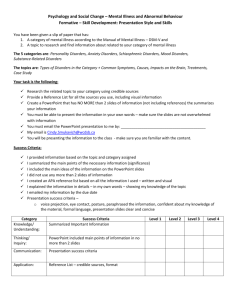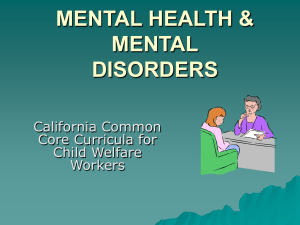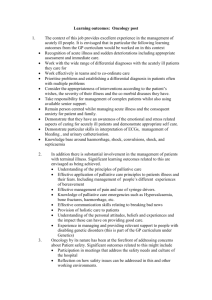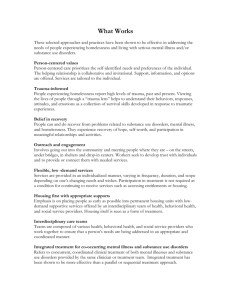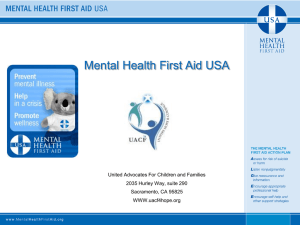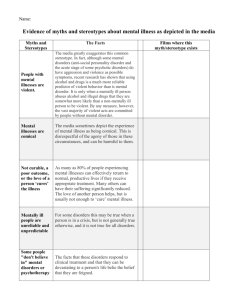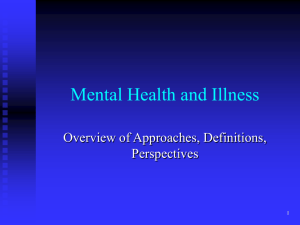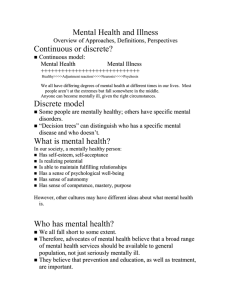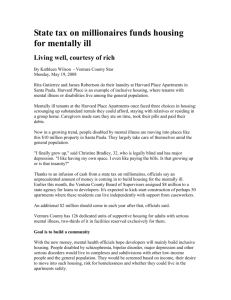mental illness
advertisement
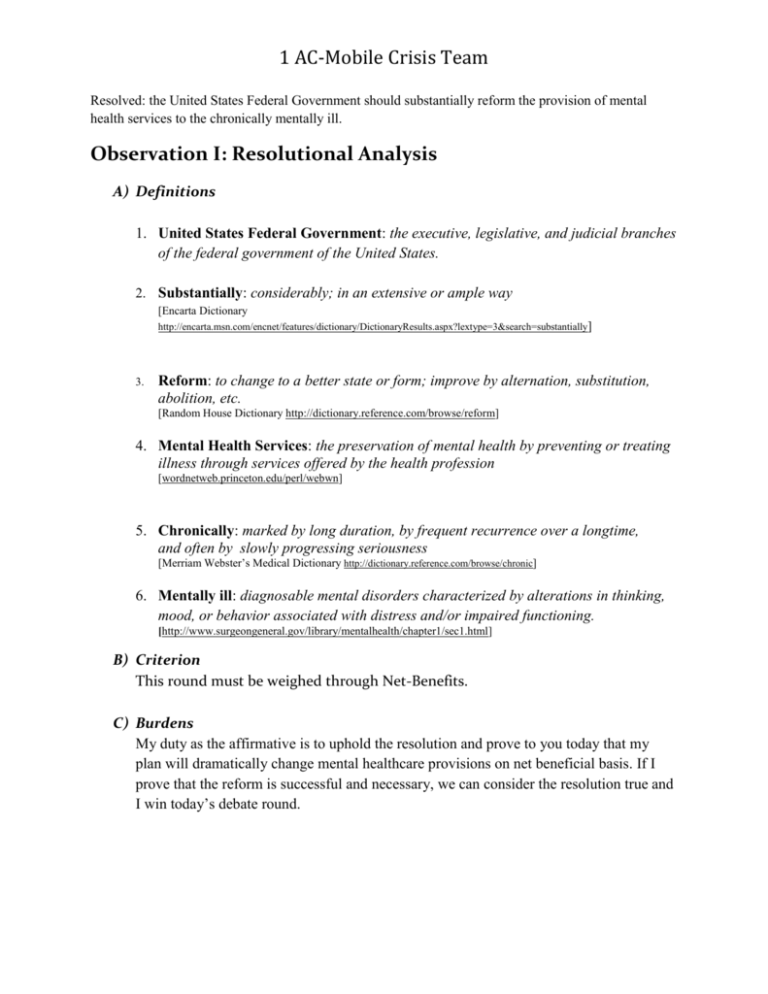
1 AC-Mobile Crisis Team Resolved: the United States Federal Government should substantially reform the provision of mental health services to the chronically mentally ill. Observation I: Resolutional Analysis A) Definitions 1. United States Federal Government: the executive, legislative, and judicial branches of the federal government of the United States. 2. Substantially: considerably; in an extensive or ample way [Encarta Dictionary http://encarta.msn.com/encnet/features/dictionary/DictionaryResults.aspx?lextype=3&search=substantially] 3. Reform: to change to a better state or form; improve by alternation, substitution, abolition, etc. [Random House Dictionary http://dictionary.reference.com/browse/reform] 4. Mental Health Services: the preservation of mental health by preventing or treating illness through services offered by the health profession [wordnetweb.princeton.edu/perl/webwn] 5. Chronically: marked by long duration, by frequent recurrence over a longtime, and often by slowly progressing seriousness [Merriam Webster’s Medical Dictionary http://dictionary.reference.com/browse/chronic] 6. Mentally ill: diagnosable mental disorders characterized by alterations in thinking, mood, or behavior associated with distress and/or impaired functioning. [http://www.surgeongeneral.gov/library/mentalhealth/chapter1/sec1.html] B) Criterion This round must be weighed through Net-Benefits. C) Burdens My duty as the affirmative is to uphold the resolution and prove to you today that my plan will dramatically change mental healthcare provisions on net beneficial basis. If I prove that the reform is successful and necessary, we can consider the resolution true and I win today’s debate round. 1 AC-Mobile Crisis Team Observation II: Status Quo A) The United States is unprepared to deal with the number of Americans, 1 in 17, that suffers from a mental illness. [Kim Foundation (Private organization focused on removing the stigma of mental illness through community forums, public broadcast radio, private speaking engagements, and published articles). Accessed November 14, 2010. http://www.thekimfoundation.org/html/about_mental_ill/statistics.html] Mental disorders are common in the United States and internationally. An estimated 26.2 percent of Americans ages 18 and older or about one in four adults suffer from a diagnosable mental disorder in a given year. When applied to the 2004 U.S. Census residential population estimate for ages 18 and older, this figure translates to 57.7 million people. Even though mental disorders are widespread in the population, the main burden of illness is concentrated in a much smaller proportion about 6 percent, or 1 in 17 who suffer from a serious mental illness. In addition, mental disorders are the leading cause of disability in the U.S. and Canada for ages 15-44. Many people suffer from more than one mental disorder at a given time. Nearly half (45 percent) of those with any mental disorder meet criteria for two or more disorders, with severity strongly related to comorbidity. In the U.S., mental disorders are diagnosed based on the Diagnostic and Statistical Manual of Mental Disorders, fourth edition (DSM-IV). 1 AC-Mobile Crisis Team Observation III: Harms A. Harm 1: Institutions are currently failing those with mental illness [Harvard Mental Health Letter 2003 “ Prisoners of mental illness.”, Jul2003, Vol. 20 Issue 1, p57, 3p] Many of our institutions have failed these people. Mental hospitals have been emptied without adequate provisions for care in the community. Involuntary psychiatric commitment has become legally difficult, so we jail people who refuse treatment but are seen as a nuisance (usually) or a danger (occasionally). Psychiatric facilities are sometimes reluctant to admit lawbreakers with mental disorders. The public has an exaggerated fear of violence by the mentally ill. We do not provide resources for offenders with mental disorders because of a belief that they will refuse help or do not deserve it. 1 AC-Mobile Crisis Team B. Harm 2: Thousands of people with mental illnesses are being unnecessarily incarcerated. [Harvard Mental Health Letter 2003 “ Prisoners of mental illness.”, Jul2003, Vol. 20 Issue 1, p57, 3p] For thousands of people with major mental illnesses -- schizophrenia, bipolar disorder, and major depression -- state prisons and county jails have become the 21st-century equivalent of insane asylums. The incarceration rate in the United States has quintupled in the last 20 years, while the number of residents in state mental hospitals has declined from nearly 600,000 in the 1950s to about 60,000 today. About 15% of prison and jail inmates have a major mental illness. Of those, more than half abuse alcohol or drugs, and many also have post-traumatic stress disorder and other anxiety disorders. According to the director of the National Center for Mental Health and Juvenile Justice, 20% of the more than 100,000 adolescents in juvenile detention facilities have a serious mental illness. 1 AC-Mobile Crisis Team Observation IV: Inherency A. States/regions are implementing crisis emergency services for the mentally ill but the USFG is ignoring the solution. 1. District of Columbia [D.C. Department of Mental Health. Accessed November 14, 2010 http://dmh.dc.gov/dmh/cwp/view,a,3,q,515833,dmhNav,%7C31250%7C.asp ] Mobile crisis services teams respond to adults throughout the District who are experiencing a psychiatric crisis whether in the homes or on the street and who are unable or unwilling to travel to receive mental health services. The teams provide crisis stabilization including dispensing medication and perform assessment for voluntary and involuntary hospitalizations and linkages to other services, such as crisis beds and substance abuse detoxification and treatment. The teams work with family members and the community based mental health provider, if appropriate, to help with follow up. Mobile crisis services was one of the primary recommendations of the Crisis Emergency Services Planning Workgroup* convened by DMH in February 2007 to review its system for delivering crisis/emergency services and to develop a comprehensive plan for coordinated crisis emergency services and crisis prevention. The workgroup was made up of representatives from the Metropolitan Police Department; Fire and Emergency Services; the Department of Health, Addiction Prevention and Recovery Administration; the Office of Unified Communications; the D.C. Superior Court; crisis residential stabilization providers; consumers; community providers, and advocates. A Final Report* was issued on December 21, 2007. 1 AC-Mobile Crisis Team 2. Iowa [Des Moines Register Newspaper. January 8, 2010. http://blogs.desmoinesregister.com/dmr/index.php/2010/01/08/crisis-team-will-aid-iowans-with-mental-disabilities/] A new crisis team members will go to the homes of Iowans with mental disabilities, or give advice via telephone. It’s part of the state’s new push to prevent the need for institutionalization, the state’s human services chief said today. “For many years Iowa has relied too heavily on institutional care for people with disabilities, especially mental retardation,” Iowa Department of Human Services Director Charles Krogmeier said in a written statement. Iowans with disabilities who live at home or in small group settings need more support and “a real choice of where to live,” he said. This month, DHS will dispatch two mobile crisis response teams to help parents or community providers to manage serious behavioral problems of people with mental disabilities, according to the news release. Behavioral issues often lead to institutionalization. The crisis response teams will be headquartered at the Woodward Resource Center. Team members will go to Iowans’ homes and give advice over the phone. Krogmeier said he also wants to reduce the number of people with behavioral challenges who must be sent to facilities out of state because there are no Iowa providers capable of meeting their needs. B. We are dealing with an attitudinal inherency because the USFG is not properly implementing a viable solution. 1 AC-Mobile Crisis Team Observation V: Plan Text Agency: USFG Mandate:The United States Federal Government, through an act of Congress and with the signature of the President, will establish a nationwide mental health mobile crisis team in connection with local emergency services. Enforcement: Through Congress and the Office of the President. Responsibilities will be delegated to the appropriate authorities through normal means. Funding: Through Normal Means Staffing: Through normal means Timeline: The plan will be effective immediately. 1 AC-Mobile Crisis Team Observation 6: Solvency A. Harm 1: Institutions no longer fail those with mental illness. Provide a card to support this claim. B. Harm 2: We reduce unnecessary incarceration for individuals with a mental illness. Provide a card to support this claim. 1 AC-Mobile Crisis Team Observation VII: Advantages Advantage 1: Less chronically mentally ill individuals will be incarcerated unnecessarily. Advantage 2: Human rights are preserved. Advantage 3: US’s global image improved. You should logically explain how each of these advantages can/will occur.
